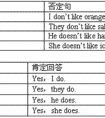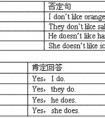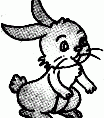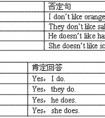Changetheformsofthefollowingsentences. 句型转换。1. Lucyworkshardatschool.(变为一般疑问句) 2. I'mmakingacall.(对划线部分进行提问) 3. Ihavesomehomeworktodo-六年级英语
6)用作代动词,例如:
---- Do you like Beijing? --你喜欢北京吗?
---- Yes, I do. --是的,喜欢。(do用作代动词,代替like Beijing.)
He knows how to drive a car, doesn't he?
他知道如何开车,对吧?
be, do, have, 他们没有词汇意义,只有语法作用,如协助构成进行体,完成体,被动态,否定句,疑问句等。
例如 He is giving a lecture. 他在作报告
He has made a plan. 他已经订了计划
The small animals are kept in the cages. 小动物都关在笼子里。
助动词协助主要动词完成以下功用:
a. 表示时态,例如:
He is singing. 他在唱歌。
He has got married. 他已结婚。
b. 表示语态,例如:
He was sent to England. 他被派往英国。
c. 构成疑问句,例如:
Do you like college life? 你喜欢大学生活吗?
Did you study English before you came here? 你来这儿之前学过英语吗?
d. 与否定副词not合用,构成否定句,例如:
I don't like him. 我不喜欢他。
e. 加强语气,例如:
Do come to the party tomorrow evening. 明天晚上一定来参加晚会。
He did know that. 他的确知道那件事。
考点名称:特殊疑问句
- 特殊疑问句:
以特殊疑问词开头,对句中某一成分提问的句子叫特殊疑问句。
常用的疑问词有:what、who、whose、which、when、where、how、why等。
特殊疑问句往往是就其中的某一成分,进行提问,而且根据情况直接回答,不能用yes或no简单回答。
常见的疑问代词有who, whose, which, what;疑问副词有when, where, why, how。
例:What do you do on Sunday? 你周日的时候干什么?
Which class are you in? 你在哪个班?
Where does Mr. Li live? 李先生住在哪?
Why are you late? 你为什么迟到? 特殊疑问句的构成:
一、 特殊的疑问词。
特殊疑问句要由疑问代词或疑问副词开头,询问的内容不同, 使用的疑问词也不同。
我们学过的疑问词有:
what(询问事物), how much(询问价格),what time (询问时间,尤其是点钟), what kind of(询问种类),why(询问原因),who(询问人), where(询问地点) 等等。如:
—What is this? 这是什么?
—It's a key. 这是一把钥匙。
—How much is it? 这个多少钱?
—It's twenty dollars. 二十美元。
—What kind of movies do you like? 你喜欢哪一类型的电影?
—I like action movies. 我喜欢动作片。
二、特殊的语序。
特殊疑问句由疑问词开头,其构成是“疑问词 + 一般疑问句”。如:
What time is it? 现在几点钟?
Who is your teacher? 谁是你的老师?
三、特殊的答语。
特殊疑问句不能用yes, no来回答,而应根据它所询问的内容直接做出回答才行。如:
— What time is it, please? 请问几点了?
— It's 7:30. 七点半了。
— Where are they? 他们在哪儿?
—They're in the playground. 他们在操场上。
—What's your favorite subject? 你最喜爱的科目是什么?
—English. 英语。
四、 特殊的语调。
一般情况下,特殊疑问句要用降调(↘)来读。如:
Who's ↘that?
How old is↘Jack?特殊疑问句有两种语序:
1.如疑问词作主语或主语的定语,即对主语或主语的定语提问,其语序是陈述句的语序:
Who is singing in the room﹖
whose bike is broken﹖
2.如疑问词作其他成分,即对其他成分提问,其语序是:
特殊疑问词+一般疑问句【特殊疑问词+be/助动词/情态动词+主语+谓语】
What does she like?
What class are you in﹖
Where are you from﹖
What time does he get up every morning﹖
How do you know﹖- 就划线部分提问的基本方法:
小学对特殊疑问句的考查主要采取对划线句子提问的方式,那么在句型转换就划线部分提问的基本方法是:
先根据划线部分词语的意思和句法功能确定用什么疑问词;
然后将原句变为一般疑问句跟在疑问词的后面即可(注意去掉划线部分)。
基本构成:疑问词+一般疑问句
A、对“物”划线用What。
This is an orange. → What is this?
We can see a cat under the desk. → What can you see under the desk?
B、对“地点”划线用Where,如果“地点”作定语时,用Which后跟被修饰的那个名词。
He is under the tree. → Where is he?
Jenny is in the classroom. → Where is Jenny?
C、对“年龄”划线用How old。
Miss Li is twenty-three. → How old is Miss Li?
My sister is five years old. → How old is your sister?
D、对“颜色”划线,用What colour。
Her sweater is red. → What colour is her sweater?
E、对“可数名词的数量”划线用How many +复数名词。
She has one red coat. → How many red coats does she have?
I have six books. → How many books do you have?
F、对“不可数名词的数量”划线用How much+不可数名词。
I want to buy three kilos of meat. →How much meat do you want to buy?
G、对“职业”划线用What。
She is a driver. → What is she?
My father is a farmer. → What is your father?
H、对“星期几”划线用What day。
It's Sunday today. → What day is it today?
I、对“时间”划线用What time。
We go to school at seven in the morning. → What time do you go to school in the morning?
It is five o’clock now. → What time is it?
考点名称:选择疑问句
- 选择疑问句:
提出两种或两种以上不同的情况,由对方加以选择作出回答的疑问句。
选择疑问句的结构有两种:
“一般疑问句+or+可选部分”和“特殊疑问句+可选部分+or+可选部分”。
回答时不用yes或no,一般情况从两个并列的选择成分中选出其中一种来回答。
例:
— Are they happy or sad? 他们是高兴还是伤心?
— They are happy. 他们高兴。
— Is your coat red or green? 你的外套是红色的还是绿色的?
— It is red. 它是红色的。
— Which girl is more beautiful, Lucy or Lily? 露西和莉莉,哪个女孩更漂亮?
— Lucy is more beautiful. 露西更漂亮。 选择疑问句特点:
1. 英语中的选择疑问句结构很简单,就是先把一般疑问句结构写出,然后在其后加上“or + 选择部分”即可,当然其标点也是问号。
如:Are you a student? (一般疑问句)你是个学生吗?
变成:Are you a student or a teacher? (选择疑问句)你是学生还是老师?
再如:Do you like playing soccer or basketball? 你喜欢踢足球还是打篮球?
Can you speak English or Chinese? 你会说英语还是汉语?2. 选择疑问句的回答不同于一般疑问句,不能用yes/no来回答,而必须选择选项进行回答。
如:Have you ever been to Beijing or Shanghai?(I‘ve been to) Shanghai.选择疑问句的结构类型:
A、一种是以一般疑问句的结构形式为基础,只是在语调上有所区别。例如:
这一类选择疑问句通常都是在前一个供选择的答案用低升调,后一个用降调;
如果有两个以上供选择的答案,则在最后一个用降调,其余都用低升调。例如:
Would you like a gin,or a whisky,or a `beer?你是要喝杜松子酒,还是威士忌酒,还是啤酒?
这种语调上的特征往往是区别选择疑问句和一般疑问句的重要标志。试比较:
Shall we leave at six or `seven?我们是 6 点动身还是 7点动身?
Shall we leave at six or seven?我们在6,7点钟动身好吗?
上述第一例是选择疑问句,其答案只能是两者之一。
We shall leave at six/ seven.我们将在6点/7点动身。
上述第二例是一般疑问句,它的答案只是 yes/no,而且并不肯定是6点或7点,甚至可能既不是6点,也不是7点:
Yes,we shall leave at six or seven.
是的,我们将在 6,7点钟动身。
No.We must leave earlier.
不。我们必须早点动身。B、另一种选择疑问句是以特殊疑问句的结构形式为基础的,也是在语调上有所区别。例如:
Which vase shall I use, the short one or the tall one ?
The tall one.小学阶段对选择疑问句的考查主要考点即是改写选择疑问句,以及选择疑问句的回答等。
- 最新内容
- 相关内容
- 网友推荐
- 图文推荐
| [家长教育] 孩子为什么会和父母感情疏离? (2019-07-14) |
| [教师分享] 给远方姐姐的一封信 (2018-11-07) |
| [教师分享] 伸缩门 (2018-11-07) |
| [教师分享] 回家乡 (2018-11-07) |
| [教师分享] 是风味也是人间 (2018-11-07) |
| [教师分享] 一句格言的启示 (2018-11-07) |
| [教师分享] 无规矩不成方圆 (2018-11-07) |
| [教师分享] 第十届全国教育名家论坛有感(二) (2018-11-07) |
| [教师分享] 贪玩的小狗 (2018-11-07) |
| [教师分享] 未命名文章 (2018-11-07) |





![____ it got four wheels?[ ]A. Have B. There C. Has-五年级英语](http://www.00-edu.com/d/file/ks/4/1/65/2019-08-31/small2ca0aeba76320ba6f81e40fe83a0e8111567199443.png)
